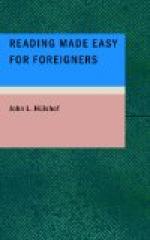LESSON XXXVII
REPUBLICS
The name Republic is written upon the oldest monuments of mankind. It has been connected in all ages with the noble and the great in art and letters.
It might be asked, what land has ever felt the influence of liberty, that has not flourished like the spring? With regard to ourselves, we can truly say that we live under a form of government the equal of which the world has never seen. Is it, then, nothing to be free? How many nations in the history of the world have proved themselves worthy of being so?
Were all men as enlightened, as brave and as self-respecting as they ought to be, would they suffer themselves to be insulted by any other form of government than a republic? Can anything be more striking or more sublime, than the idea of a republic like ours; which spreads over a territory far more extensive than that of the ancient Roman empire?
And upon what is this great and glorious combination of states, so admirably united, really founded? It is founded upon the maxims of common sense and reason, without military despotism or monarchical domination of any kind. The people simply govern themselves, and the government is of the people, by the people and for the people.
FREEDOM OF THOUGHT
We must have an end of all persecution of ideas.
I condemn the government of France and Prussia when they oppress the Jesuits.
I condemn the government of Russia when it oppresses the Jews.
I affirm that to persecute ideas is like persecuting light, air, electricity, or the magnetic fluid.
Ideas escape all persecution. When repressed they explode like powder.
LESSON XXXVIII
FALSE NOTIONS OF LIBERTY
People talk of liberty as if it meant the liberty of doing what a man likes. The only liberty that a man should ask for is the privilege of removing all restrictions that prevent his doing what he ought to do.
I call that man free who is able to rule himself. I call him free who has his flesh in subjection to his spirit; who fears doing wrong, but who fears nothing else.
I call that man free who has learned that liberty consists in obedience to the power and to the will and to the law that his higher soul approves. He is not free because he does what he likes, but he is free because he does what he ought.
Some people think there is no liberty in obedience. I tell you there is no liberty except in loyal obedience. Did you ever see a mother kept at home, a kind of prisoner, by her sick child, obeying its every wish and caprice? Will you call that mother a slave? Or is this obedience the obedience of slavery? I call it the obedience of the highest liberty—the liberty of love.




